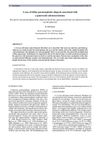April 2023 in “Medizinische Genetik” Male-pattern hair loss is largely influenced by genetics, with key genes identified.
August 2022 in “Nutrients” Nutritional supplements may help improve hair growth in female pattern hair loss.
 June 2022 in “International journal of drug delivery technology”
June 2022 in “International journal of drug delivery technology” Convolvulus arvensis ethanolic extract can potentially promote hair growth and reduce hair loss.
December 2021 in “Egyptian Journal of Dermatology and Venereology” Oxidative stress may worsen female pattern hair loss and could help track the disease and treatment.
 158 citations,
February 2000 in “Archives of dermatology”
158 citations,
February 2000 in “Archives of dermatology” Some people with pattern hair loss may also have scalp inflammation and scarring similar to lichen planopilaris.
 57 citations,
May 2016 in “Journal of Dermatological Treatment”
57 citations,
May 2016 in “Journal of Dermatological Treatment” PRP therapy may effectively treat hair loss, but more research needed.
 47 citations,
June 2016 in “JAMA Dermatology”
47 citations,
June 2016 in “JAMA Dermatology” Men with early hair loss have similar hormone levels to women with PCOS, possibly increasing risk of obesity and heart issues.
 30 citations,
September 2017 in “Clinics in Dermatology”
30 citations,
September 2017 in “Clinics in Dermatology” Men with common hair loss may have a higher risk of heart disease and diabetes, and should be checked for these conditions.
 28 citations,
August 2011 in “Journal of The American Academy of Dermatology”
28 citations,
August 2011 in “Journal of The American Academy of Dermatology” Early hair loss may indicate prostate issues.
 27 citations,
June 2019 in “Aesthetic Plastic Surgery”
27 citations,
June 2019 in “Aesthetic Plastic Surgery” Platelet-Rich Plasma (PRP) treatment may increase hair growth for genetic hair loss, but more research is needed to confirm this.
 14 citations,
March 2014 in “Journal of The European Academy of Dermatology and Venereology”
14 citations,
March 2014 in “Journal of The European Academy of Dermatology and Venereology” Young adults with hair loss face higher risk of stiff arteries.

New treatments for hair loss, including a compound called "ALRV5XR", platelet-rich plasma, and Adult Stem Cell-based therapy, are showing promise, but more trials are needed for confirmation.
 3 citations,
January 1996 in “Pharmacotherapy: The Journal of Human Pharmacology and Drug Therapy”
3 citations,
January 1996 in “Pharmacotherapy: The Journal of Human Pharmacology and Drug Therapy” Zidovudine may cause hair loss in advanced-stage HIV patients.
 1 citations,
March 2021 in “Skin health and disease”
1 citations,
March 2021 in “Skin health and disease” Better hair loss models needed for research.
 1 citations,
October 2020 in “Journal of Cosmetic Dermatology”
1 citations,
October 2020 in “Journal of Cosmetic Dermatology” Possible link between hair loss and metabolic syndrome, with RANTES as a potential clue.
 1 citations,
January 2013 in “Elsevier eBooks”
1 citations,
January 2013 in “Elsevier eBooks” The document reviews various hair and nail disorders, their causes, and treatments, emphasizing the need for proper diagnosis and the link between nail changes and systemic diseases.
 November 2023 in “International Journal of Cosmetic Science”
November 2023 in “International Journal of Cosmetic Science” Wheat polar lipid complex reduces hair loss and improves hair growth in women.
 February 2008 in “Vlaams dierengeneeskundig tijdschrift”
February 2008 in “Vlaams dierengeneeskundig tijdschrift” A cat's hair loss was linked to a severe pancreatic cancer.
 July 2018 in “Journal of Evolution of medical and Dental Sciences”
July 2018 in “Journal of Evolution of medical and Dental Sciences” Men with common hair loss (AGA) are more likely to have metabolic syndrome, which increases heart disease risk. Early screening could help prevent heart disease. More research is needed to understand this relationship better.
 August 2015 in “Dermatologica Sinica”
August 2015 in “Dermatologica Sinica” Men with severe hair loss may have poorer sperm quality.
 151 citations,
February 2007 in “International Journal of Dermatology”
151 citations,
February 2007 in “International Journal of Dermatology” Alopecia areata causes hair loss, has no cure, and various treatments exist.
 110 citations,
July 2010 in “Journal of The American Academy of Dermatology”
110 citations,
July 2010 in “Journal of The American Academy of Dermatology” Hair loss linked to higher heart disease risk in both men and women.
 95 citations,
November 2016 in “Journal of The American Academy of Dermatology”
95 citations,
November 2016 in “Journal of The American Academy of Dermatology” Treatments for permanent hair loss from scarring aim to stop further loss, not regrow hair, and vary by condition, with partial success common.
 51 citations,
January 2012 in “Annals of Dermatology”
51 citations,
January 2012 in “Annals of Dermatology” Asian hair loss differs from Europeans; consider individual needs and psychological well-being for treatment.
 42 citations,
March 2018 in “PLOS Biology”
42 citations,
March 2018 in “PLOS Biology” Autophagy is important for human hair growth and health.
 41 citations,
August 2007 in “European Journal of Gastroenterology & Hepatology”
41 citations,
August 2007 in “European Journal of Gastroenterology & Hepatology” A woman's total hair loss from hepatitis C treatment grew back after stopping the medication.
 37 citations,
April 2012 in “British Journal of Dermatology”
37 citations,
April 2012 in “British Journal of Dermatology” Female hair loss linked to metabolic syndrome, not in males.
 31 citations,
May 2012 in “European Journal of Dermatology”
31 citations,
May 2012 in “European Journal of Dermatology” Menopause affects hair and skin; more research needed for treatment.
 26 citations,
August 2019 in “Stem Cell Research & Therapy”
26 citations,
August 2019 in “Stem Cell Research & Therapy” PBX1 helps hair stem cells grow and change by turning on certain cell signals and preventing cell death, which may be useful for hair regrowth treatments.
 18 citations,
April 2021 in “Experimental Dermatology”
18 citations,
April 2021 in “Experimental Dermatology” COVID-19 may cause hair loss and scalp pain due to inflammation and changes in hair follicle receptors, but these symptoms typically resolve in 2 to 4 months.


























